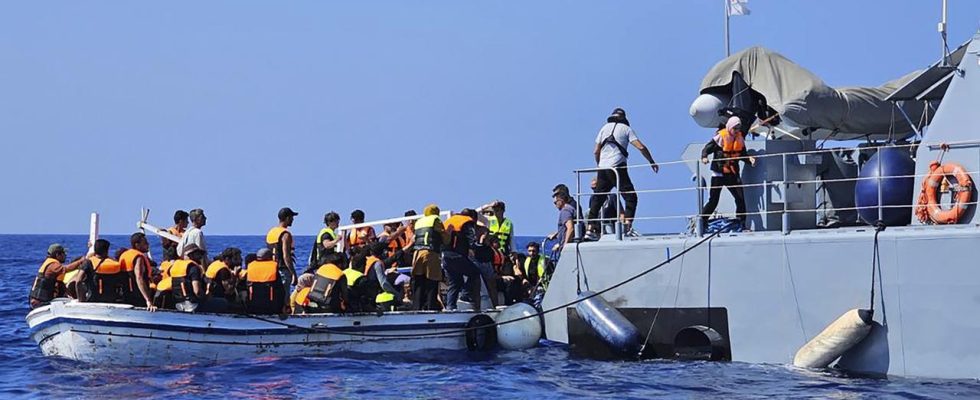european magazine
The small Mediterranean republic of Cyprus has to accept the most asylum applications in the EU in relation to its population. Many migrants flee across the so-called green border. This is a lucrative business for smugglers.
The huge Pournara refugee camp is located just a few kilometers from the Cypriot capital Nicosia. It opened four years ago, and at that time it was planned for around 1,000 migrants. At the end of last year there were twice as many, as the EU Commission reported.
Refugees from Africa and the Arab region in particular live densely packed in containers. Access is only possible if accompanied by the administration and with lengthy prior approval. But even though the situation is said to have improved in recent months, the conditions are still appalling. Nobody here wants to be recognized. Names may not be mentioned either.
Huge network of smugglers
Finally a young couple begins to talk. They came to Turkey from Pakistan, got a student visa for northern Cyprus and then after a few days fled to the Greek Cypriot south of the island and applied for asylum there.
They say there is a huge network of smugglers, in almost every town in the northern part of the island. Contact can be made very quickly, they say. An escape across the so-called green border could then be arranged at any time for a few hundred euros.
A view of huts surrounded by a fence with barbed wire in the refugee camp in Pournara in Cyprus.
Across the green border into the dream destination of Europe
The so-called green line separates Cyprus into a Greek and a Turkish part. Anyone who manages to cross from north to south is in the EU – the dream destination for many refugees. And even though the Republic of Cyprus is not a member of the Schengen area, many see the country as a kind of stepping stone to Germany, France or Italy.
There is no easier, cheaper or safer route to the EU for people from Africa or Asia, says migration researcher Gerald Knaus in an interview with the “Frankfurter Rundschau”. The island is a “junction of a new, unique immigration movement”.
A big market for smugglers
As a professor at the University of Nicosia, Nikos Trimiklinotis has been observing this development for a long time. He and his team regularly publish studies that deal with the refugee problem on the island.
Trimiklinotis says the number of refugees from the northern part is very high, as is the profit that smugglers make from it. It is a “dirty business on the backs of the poorest people”.
And now that many other escape routes are blocked, the price continues to rise. He indirectly blames the administration in the Turkish part of the island for this. According to Trimiklinotis, it doesn’t do enough to prevent smugglers from doing their business; it makes it too easy for them to cross the border with their customers.
The system behind it
75 percent of the refugees come from the Turkish part overland, says Trimiklinotis. Only a few chose the very dangerous sea route. In percentage terms, the small island republic with around 920,000 inhabitants has the highest number of asylum applications in the EU.
Nikos Trimiklinotis explains the system behind it: There are a lot of universities in the Turkish part of the island. Of the 400,000 residents, a quarter are students. Trimiklinotis somewhat contemptuously calls these “baby universities”.
The tuition fees are relatively low in comparison. Once registered, migrants come to the northern part of the island – mostly via Istanbul. They stayed there for a few days at most. Because immediately after arrival the search for a passage into the Greek part begins.
And that’s where the smuggling gangs come into play. For around 500 euros there would be a complete package: planning, transfer, asylum application. Depending on the political situation, the border is sometimes controlled more, sometimes less. In any case, it is permeable, says the researcher.
Since Turkey does not recognize the Republic of Cyprus as a state, direct negotiations on this refugee problem are not possible. As long as the division of Cyprus lasts, the gate to the EU remains wide open.
Powerless against smugglers
The police in Cyprus say they only broke up a smuggling ring in June. The smugglers are said to have sold fake residence documents to migrants.
14 members of the smuggling ring were arrested. Experts like Trimiklinotis say this is just a drop in the ocean. The smugglers would quickly reorganize. Ultimately, a political solution must be found. But we are far from that.
Destination: Mainland Europe
Very few refugees want to stay in Cyprus. The Pakistani couple from the Pournara refugee camp also want to leave, preferably to France or Germany.
They invested 2,500 euros and then survived the smuggling route unscathed. Now they hope to be able to leave the camp soon. But they also notice that the climate towards refugees on the island is becoming increasingly harsh.
Just a few weeks ago there were right-wing extremist riots against migrants in Limassol on the south coast. The woman tells us at the end that it is hard. “But you have to endure it if you want security.”

